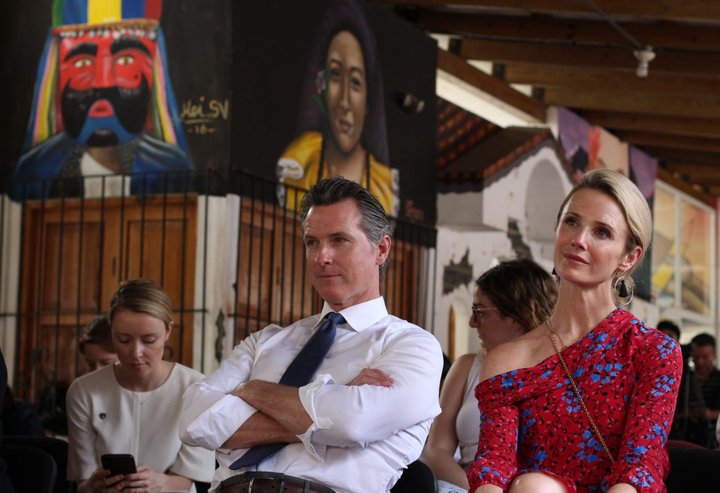
California Gov. Gavin Newsom wife Jennifer Siebel Newsom listen to a recital of violins by young Salvadorans who belong to a music academy in Panchimalco, El Salvador, AP Photo by Salvador Melendez/Pool via CALmatters.
California
Gov. Gavin Newsom says he intends to help steer U.S. immigration
policy just as former Gov. Jerry Brown influenced climate change
policy — because California’s size, robust economy, diversity and
political clout allow the state to “punch above our weight.”
“The one area that California should do more is on immigration policy,” he said today, the second of his three days on an official visit to El Salvador. He added that in the last decade, the state ceded that role to governors from more conservative border states. “That’s why I’m down here. That’s what I want to bring back in terms of the leadership that we want to advance for our state.”
The stated purpose of his trip: to learn more about the root causes driving Central Americans to migrate by the thousands in the last year and how California could help here or at home. It also raises his political profile as a counterpoint to President Donald Trump.
Newsom said he’s relying on the powerful California congressional delegation — which includes Democratic House Speaker Nancy Pelosi of San Francisco and GOP House Minority Leader Kevin McCarthy of Bakersfield — and local leaders to work from the bottom up to compel changes in the Trump administration’s hostile approach to immigration from places such as Central America.
“We have a unique responsibility and an opportunity to advance a different conversation,” he said after a session with humanitarian, LBGT and women’s rights advocates in the small town of Panchimalco, about an hour outside of San Salvador.
Since arriving on Sunday, Newsom has met with El Salvador’s President Salvador Sánchez Cerén; U.S. ambassador Jean Manes, a career diplomat stationed at the embassy since the Obama administration; Salvadoran mayors and community members.
While Newsom focuses on “managing up” to impact federal immigration policy in the remaining years of the Trump administration, humanitarian advocates on the ground in El Salvador say they hope he will have a positive impact on economic opportunities and human rights.
“He can influence the El Salvador government, the El Salvador legislators, to get them interested in how to reform workplace regulations, how to ratify codes that protect the rights of women,” said Montserrat Arevalo Alvarado. She’s executive director of Mujeres Transformando, an organization pushing for better working conditions for the 70,000 women who work in clothing factories, and make clothes mostly exported to the U.S.
“He can send letters, bring delegations and spotlight what is happening here,” she said. “I believe he can because our leaders go to the United States, too, and it’s important they listen to him.”
Traveling with only his wife Jennifer Siebel Newsom, Assemblywoman Wendy Carrillo, some staff and reporters — as well as a security contingent from the California Highway Patrol — the governor has received a warm welcome here.
People in the mountain town of Panchimalco were waiting for him when he arrived this afternoon. Salvadoran children adorned in colorful costumes danced and boys in white played traditional instruments — part of a cultural arts program intended to help the children avoid gangs and possibly create a path to future jobs through traditional artisanry.
Earlier in the day the Newsoms toured a deportee processing center, where Salvadorans who have been returned to the country are fingerprinted, interviewed and offered assistance if they need it. Several returned migrants shared their stories with the governor, telling him they left El Salvador because they lacked jobs and feared for their safety. Two were detained in Mexico and deported. A third made it to Houston, but returned after six months for a family reason.
The Newsoms and Carillo also met privately with President Cerén and the U.S. Ambassador Manes. Afterward the governor said little about the meetings, but did report that both expressed concern about having just met with Trump administration officials to discuss U.S. humanitarian aid — more than $450 million — only to have President Trump move to cut off the aid.
“The U.S. aid we are providing is making a real difference in people’s lives, not just from a security perspective but from an economic perspective,” he said he learned. “The absurdity of the U.S. would pull back from something that is working and would create a problem they want to fix.”
He said his wife asked President Cerén about the situation for women in El Salvador, and particularly women in prison. The issue is important to Salvadoran American leaders in Los Angeles, who say many women in El Salvador face incredible violence and abuse, which often propels their migration.
“Their American dream, as part of America, is to stay in their home and in their community,” said Angelica Salas, executive director of the Coalition for Human Rights Los Angeles. “Nobody comes because they want to.”
Newsom didn’t disclose the president’s response.
###
CALmatters.org is a nonprofit, nonpartisan media venture explaining California policies and politics.
CLICK TO MANAGE